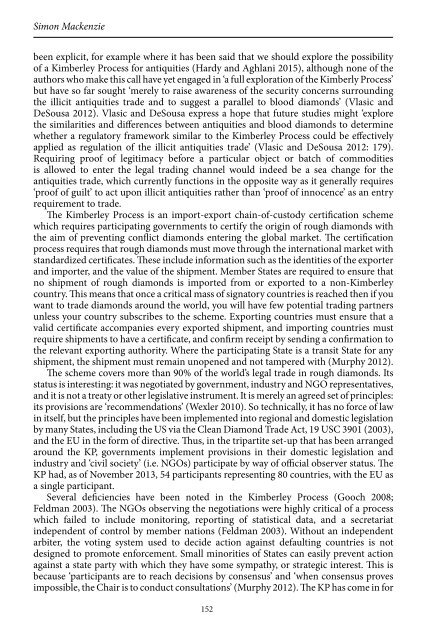Countering
Book_observatory_illicit_traffic_version%20issuu
Book_observatory_illicit_traffic_version%20issuu
Create successful ePaper yourself
Turn your PDF publications into a flip-book with our unique Google optimized e-Paper software.
Transnational Criminal Markets<br />
quite widespread criticism for relying ‘too heavily on Participants policing themselves’<br />
(Malamut 2005: 47) – a criticism which will be equally familiar to critics of a trade selfregulation<br />
approach to illicit antiquities (Gerstenblith 2007).<br />
The strength of the KP lies in the honesty or incorruptibility of traders in the chain:<br />
so the system cannot<br />
promise, with complete confidence, that no government inspector at the mining site was bribed<br />
to deny that guerilla forces controlled the mines, that no customs official was bribed to issue a<br />
certificate that the package of stones was conflict-free, and that no diamond merchant on 47 th St.<br />
in Manhattan slipped a gem into the package bought cheap from someone who had smuggled it in<br />
under his tongue (Feldman 2003).<br />
In many source countries, unlicensed ‘artisanal’ miners operate alongside licensed miners<br />
and dealers, and are allowed to do so by local government inspectors who may impose<br />
their own conditions on turning a blind eye. Licensed miners can purchase diamonds<br />
from unlicensed miners, so laundering them into the system at source (Malamut 2005;<br />
Kaplan 2003).<br />
The flaws in the system are perceived to be so severe that Global Witness, the NGO<br />
that spearheaded the campaigning that led to the establishment of the KP in 2003, ‘left’<br />
the KP in December 2011. It resigned its position at the helm of the Kimberley Process<br />
Civil Society Coalition, disappointed at the lack of enforcement action by governments<br />
and the absence of independent verification of the industry’s self-regulation approach<br />
to the provision of supply chain warranties. Charmain Gooch, co-founder of Global<br />
Witness and the leader of its KP related campaigning, has said the lack of serious control<br />
exercised by participants in the KP ‘has turned an international conflict prevention<br />
mechanism into a cynical corporate accreditation scheme’ (Gooch 2011). It ‘has done<br />
much that is useful but ultimately has failed to deliver[...]; it has proved beyond doubt<br />
that voluntary schemes are not going to cut it[…]’ (Gooch 2011); ‘it has become an<br />
accomplice to diamond laundering – whereby dirty diamonds are mixed in with clean<br />
gems’ (Global Witness 2011). The NGO has, along with others, expressed dismay at the<br />
KP’s failure adequately to sanction Zimbabwe in respect of widespread human rights<br />
abuses at mines in the Marange region (Human Rights Watch 2009). Being a case of<br />
violence, corruption and abuse by the police and the military of the Mugabe regime, the<br />
problem the KP has with state abuses was highlighted: these are not ‘conflict diamonds’<br />
fuelling a rebel war, although they may be brought within the definition due to the<br />
obvious problems with supply chain integrity. Generally, however, human rights abuses<br />
at the hands of government forces are not relevant concerns for the KP with its emphasis<br />
on conflict diamonds.<br />
Similar to the antiquities trade, diamond dealers have never been especially eager to<br />
reveal the source of their stock’ since ‘the traditions of the industry include secrecy and<br />
mystery’ (Feldman 2003). Diamond dealers use bourses in major diamond trading cities<br />
as venues in which to perform their middleman role in the industry, and those bourses<br />
are capable of expelling dealers who are considered untrustworthy, effectively barring<br />
them from further participation in the world trade. Antiquities dealers have associations<br />
too, but these do not exercise the same level of control over trading possibilities: many<br />
dealers are not association members, and expulsion from an association does not carry<br />
the same ‘excommunication’ meaning as where ‘it ends one’s ability to operate as a<br />
significant player in the diamond industry’ (Feldman 2003). The penalties of the industry<br />
self-regulatory approach in the KP do not therefore look like they would transfer across<br />
153


